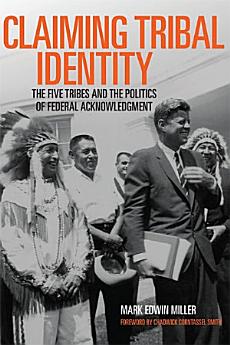Claiming Tribal Identity: The Five Tribes and the Politics of Federal Acknowledgment
About this ebook
Miller explains how politics, economics, and such slippery issues as tribal and racial identity drive the conflicts between federally recognized tribal entities like the Cherokee Nation of Oklahoma, and other groups such as the Southeastern Cherokee Confederacy that also seek sovereignty. Battles over which groups can claim authentic Indian identity are fought both within the Bureau of Indian Affairs’ Federal Acknowledgment Process and in Atlanta, Montgomery, and other capitals where legislators grant state recognition to Indian-identifying enclaves without consulting federally recognized tribes with similar names.
Miller’s analysis recognizes the arguments on all sides—both the scholars and activists who see tribal affiliation as an individual choice, and the tribal governments that view unrecognized tribes as fraudulent. Groups such as the Lumbees, the Lower Muscogee Creeks, and the Mowa Choctaws, inspired by the civil rights movement and the War on Poverty, have evolved in surprising ways, as have traditional tribal governments.
Describing the significance of casino gambling, the leader of one unrecognized group said, “It’s no longer a matter of red; it’s a matter of green.” Either a positive or a negative development, depending on who is telling the story, the casinos’ economic impact has clouded what were previously issues purely of law, ethics, and justice. Drawing on both documents and personal interviews, Miller unravels the tangled politics of Indian identity and sovereignty. His lively, clearly argued book will be vital reading for tribal leaders, policy makers, and scholars.
Ratings and reviews
About the author
Mark Edwin Miller, Department Chair and Professor of History in the Department of History, Sociology, and Anthropology at Southern Utah University, Cedar City, has published articles on race and ethnicity and on indigenous identity and politics in the Journal of Arizona History, Journal of Mormon History, and Journal of the Southwest. He has contributed a chapter in the forthcoming textbook Utah’s History and has been quoted in the Washington Post, the Wall Street Journal, and other publications. He is author of Forgotten Tribes: Unrecognized Indians and the Federal Acknowledgment Process. He and his wife, Gia, have three children, Delaney, Regan, and Gage.
Chad Smith was Principal Chief of the Cherokee Nation from 1999 to 2011 and helped to grow the nation’s assets from $150 million to $1.2 billion, increased healthcare services, created 6,000 jobs, and dramatically advanced education, language, and cultural preservation. He is now running his own consulting business. Smith holds a J.D. from the University of Tulsa and an M.B.A. from the University of Nevada-Las Vegas.




